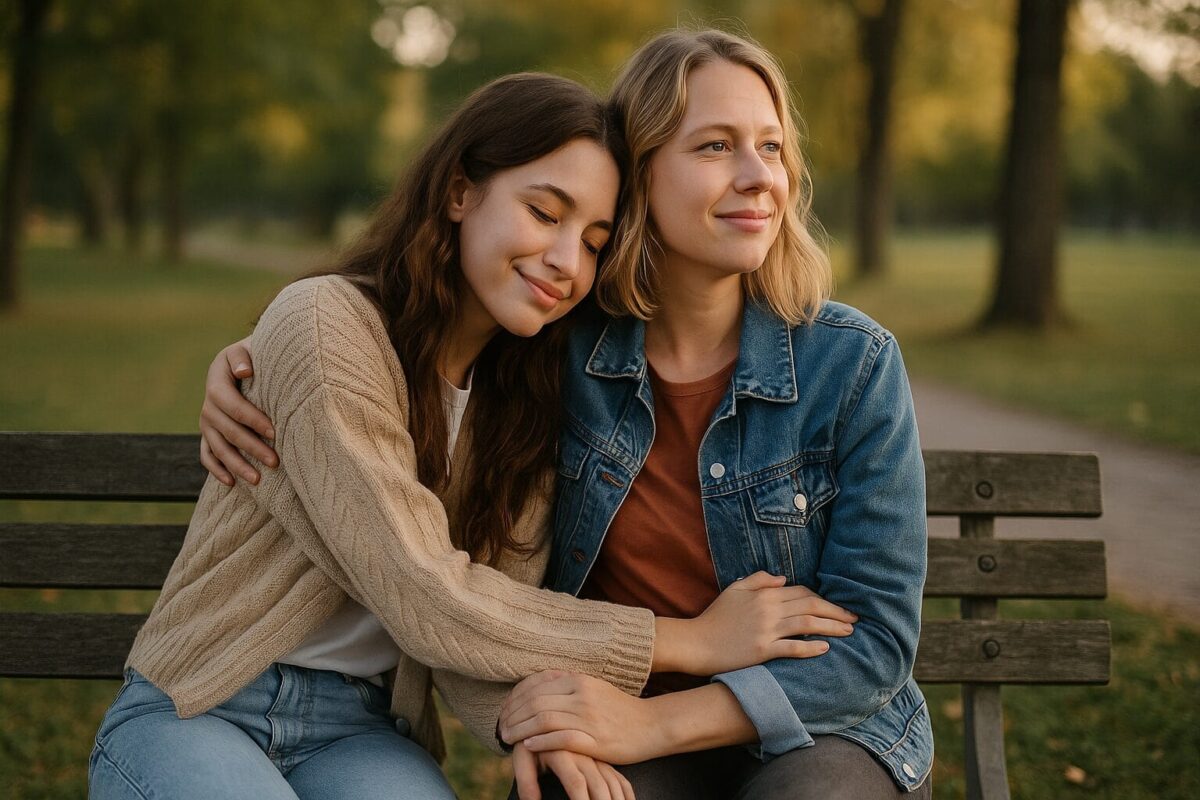For years, I held onto friendships like they were fragile glass. I believed that letting friendships evolve meant failure, so I resisted every natural shift. I believed that any change in connection felt like a personal defeat. Meanwhile, I exhausted myself trying to maintain relationships that no longer fit who I was becoming. The turning point came when I realized something profound about letting friendships evolve. Friendships aren’t meant to stay frozen in time.
I used to think that good friends stayed exactly the same forever. We’d have the same inside jokes, the same weekend routines, the same deep conversations. However, life doesn’t work that way. People grow, priorities shift, and circumstances change dramatically. What I learned is that resisting this natural evolution created more pain than peace. The moment I stopped fighting against change, everything transformed.
The Weight of Forced Connection
There’s a specific kind of exhaustion that comes from maintaining friendships out of obligation. I felt it every time I forced myself to attend gatherings that drained me. I experienced it when conversations felt rehearsed rather than genuine. On the other hand, I couldn’t admit this truth to myself. Society teaches us that letting friendships fade means we’re bad people. We’re told that real friends stick together no matter what happens.
This belief kept me trapped in relationships that no longer served either person. I’d spend hours crafting text messages to friends I no longer resonated with. I’d accept invitations to events I didn’t want to attend. The guilt of potentially hurting someone else outweighed my own need for authentic connection. Eventually, this pattern led to resentment, anxiety, and a profound sense of disconnection.
Here’s the thing about forced friendships: both people can feel it. The other person likely sensed my discomfort even when I tried to hide it. They probably felt obligated to maintain the connection too. We were both performing friendship rather than experiencing it. This realization changed everything for me. It opened the door to a more honest way of relating.
Understanding How Letting Friendships Evolve Works Naturally
Friendships evolve for countless reasons, and most have nothing to do with failure. Sometimes people move to different cities and the distance creates natural separation. Other times, major life transitions like marriage, parenthood, or career changes shift priorities completely. Personal growth can also lead friends in different directions. According to research from Psychology Today, friendships change over time as people grow and life circumstances shift (https://www.psychologytoday.com/us/blog/lifetime-connections/202002/why-do-relationships-change-over-time). None of these scenarios indicate that the friendship was meaningless or that anyone did something wrong.
I learned to recognize the difference between temporary distance and permanent drift. Some friendships simply enter quieter seasons. Life gets busy, and consistent communication becomes challenging. This doesn’t mean the connection is broken. When we reconnect, it feels like no time has passed. These are the friendships worth preserving through natural ebbs and flows.
However, some friendships genuinely run their course. The values that once united you no longer align. Conversations feel superficial because you’ve grown in different directions. There’s no animosity, just a recognition that you’re on separate paths now. Accepting this reality without judgment brings tremendous relief. It creates space for new connections that better match who you’re becoming.
The key is learning to trust your intuition about which friendships need space. Your inner wisdom knows when a connection is temporarily dormant versus permanently outgrown. Trusting yourself in relationships becomes easier when you stop judging natural changes as personal failures. This shift in perspective transforms how you experience all your connections.
The Freedom in Releasing Control When Letting Friendships Evolve
Letting friendships evolve naturally requires releasing the need to control outcomes. I had to stop micromanaging how often we communicated. I stopped keeping score of who reached out last. Instead, I allowed each friendship to find its own rhythm. Some friends naturally stayed close with weekly contact. Others drifted into quarterly check-ins that felt perfectly comfortable.
This approach initially triggered deep fear within me. What if they forgot about me? What if they found better friends? These anxious thoughts revealed my underlying insecurity about being valued. I realized I’d been using constant connection to prove my worth. When I released this pattern, I discovered something beautiful. The friends who truly resonated with me stayed connected effortlessly.
Moreover, releasing control created room for authentic spontaneity. Instead of scheduled coffee dates that felt obligatory, we connected when genuine desire arose. Our conversations deepened because we weren’t maintaining surface-level contact out of duty. The quality of connection improved dramatically even though the frequency sometimes decreased.
Navigating Grief and Acceptance
Even healthy friendship evolution involves grief. I mourned the versions of friendships that once brought me joy. I felt sadness remembering inside jokes that no longer made sense. There’s legitimate loss when someone who once knew you intimately becomes a distant acquaintance. Acknowledging this grief matters deeply.
I gave myself permission to feel sad about changing friendships. I stopped trying to be positive about every transition. Sometimes friendships end in painful ways, and pretending otherwise doesn’t serve anyone. Research from Greater Good Science Center at UC Berkeley shows that acknowledging loss in relationships is essential for emotional health and future connection quality (https://greatergood.berkeley.edu/topic/compassion/definition). However, I also learned to hold grief alongside gratitude. I could feel sad about losing closeness while appreciating what that friendship taught me.
Acceptance doesn’t mean indifference or lack of care. It means recognizing reality without constant resistance. I accepted that some people played important roles during specific chapters of my life. Their presence during those times was meaningful even though they’re not part of my current story. This perspective allowed me to honor past connections without clinging desperately to their continuation.
Creating Space for New Connections
When I stopped forcing old friendships, something unexpected happened. I suddenly had energy for new relationships. I noticed interesting people I’d previously overlooked because I was too busy maintaining existing connections. I had capacity to invest in friendships that genuinely excited me. This shift felt both liberating and slightly scary.
New friendships require vulnerability and openness. I had to risk being myself with people who didn’t know my history. Initially, this felt exhausting after years of established relationships. However, it also felt refreshing. These new friends knew the current version of me. They didn’t have expectations based on who I used to be.
I also rediscovered solitude as a valid choice. Not every moment needed to be filled with social connection. I learned that being alone didn’t mean being lonely. Sometimes the most peaceful moments came from my own company. This realization reduced the pressure I placed on friendships to constantly fulfill me.
Practical Ways to Let Friendships Evolve
Implementing this philosophy requires intentional practice. I started by examining my motivations for maintaining each friendship. Was I staying connected out of genuine affection or obligation? This honest inventory revealed patterns I hadn’t recognized before. Some friendships energized me while others consistently drained me.
I then practiced setting boundaries without guilt. If a friend invited me somewhere I genuinely didn’t want to go, I declined kindly. I stopped over-explaining my unavailability or making elaborate excuses. A simple “I can’t make it, but thank you for thinking of me” became sufficient. This honesty actually strengthened certain friendships by removing pretense.
Additionally, I communicated my need for different connection styles. Some friends preferred frequent texting while I needed less constant communication. Rather than assuming incompatibility, we discussed our preferences openly. Many friendships improved dramatically once we stopped making assumptions about what the other person expected.
I also released the urge to constantly update distant friends on every life detail. Social media often creates pressure to maintain artificial closeness. Instead, I reached out personally when something significant happened or when I genuinely missed someone. This made our interactions more meaningful and less performative.
The Peace That Comes After Letting Friendships Evolve
Today, my friendships feel lighter and more genuine. I no longer carry anxiety about whether I’m being a good enough friend. I trust that people who want connection with me will make it known. Simultaneously, I make efforts toward friendships that genuinely matter to me. There’s reciprocity without scorekeeping.
The peace I’ve found isn’t about having fewer friends. It’s about having more authentic relationships. Each friendship serves a purpose and brings something valuable to my life. I no longer collect friends like trophies to prove my likability. Quality has replaced quantity in the most fulfilling way possible.
Furthermore, I’ve stopped fearing that changing friendships make me a bad person. Growth sometimes means growing apart, and that’s completely natural. The friends who are meant to remain in my life continue to show up. The ones who drift away free me to meet people who better align with my current journey.
This evolution taught me about unconditional acceptance. I learned to accept others exactly as they are without trying to change them. I also learned to accept myself and my own needs without apology. Both forms of acceptance work together to create peaceful, sustainable friendships.
Moving Forward With Compassion Through Letting Friendships Evolve
Looking back, I wish someone had told me earlier that friendship evolution is normal. I wish I’d known that letting go doesn’t diminish what once was. Every friendship taught me something valuable regardless of how long it lasted. Some people are meant for seasons, not lifetimes, and both types of friendships matter deeply.
Now I approach new friendships with openness and fewer expectations. I enjoy people while they’re present without demanding permanence. I celebrate depth of connection rather than length of time. This mindset allows relationships to unfold naturally without the pressure of predefined outcomes.
The journey toward this peace wasn’t linear or easy. I struggled with guilt, fear, and uncertainty along the way. However, each difficult moment taught me something essential about myself and relationships. I learned that true friendship doesn’t require constant maintenance or forced proximity. It exists in mutual respect, authentic care, and the freedom to evolve.
Today, when friendships naturally shift, I no longer panic. I trust the process of change. I honor what was while remaining open to what will be. This trust has brought me more peace than any amount of control ever could. The friendships that remain feel chosen rather than obligatory, deep rather than superficial, and genuinely fulfilling in every way.

